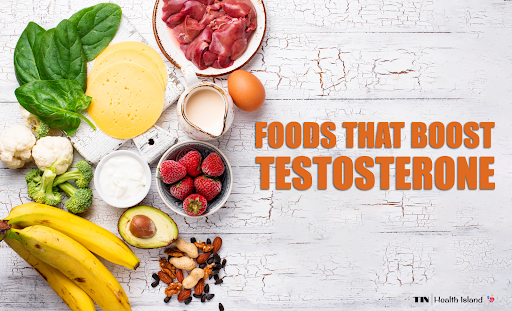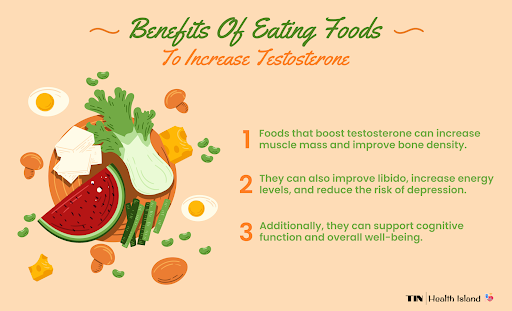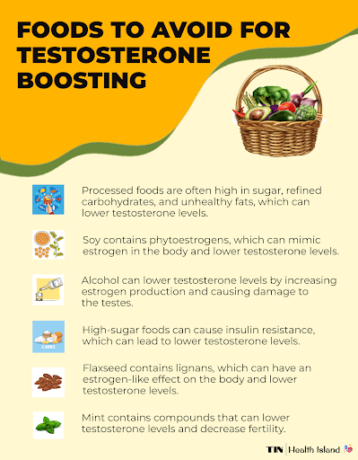Who doesn’t know about testosterone? The very hormone that helps healthy men and women regulate their overall health. But low levels of this hormone can cause several issues, such as erectile dysfunction, loss of muscle mass, hair loss, etc. So many people use testosterone boosters to increase their testosterone levels. But did you know that there are certain foods that boost testosterone naturally?
It can save you from expensive medical treatments like testosterone replacement therapy and can be a good alternative to taking other supplements for testosterone metabolism, like magnesium supplements.
We researched, from discovering why these foods are best for testosterone production to alternative natural options that can help you with testosterone. Also, the ease of availability of these foods at health food stores.
Top 11 Best Testosterone Boosting Foods
Green Leafy Vegetables
Micronutrients such as magnesium are abundant in leafy greens. Older men need to maintain a healthy level of testosterone, and they can do this by adding magnesium to their diet. It also gives them energy and helps produce red blood cells to carry oxygen all over the body. As a result, it can also act as a natural testosterone booster.
Magnesium has other health benefits as well. It can help reduce oxidative stress. Too much oxidative stress and inflammation can lead to low testosterone. So, adding testosterone boosting foods rich in antioxidants could help you keep optimal T-levels. Research shows that healthy men with high magnesium levels in their diet have higher testosterone than those without. Researchers have extensively studied the effects of green leafy vegetables on male diabetic rats.
Spinach is rich in folate. It is a critical nutrient that can help increase blood flow. Additionally, it is also responsible for boosting sex drive. It also contains a very important luteinizing hormone boosting compound that can help with overall reproductive health.
When cooked, spinach has over 100% of the recommended folate intake per cup, making it one of the best sources. Furthermore, it also contains magnesium. Magnesium is an essential nutrient for heart health and blood pressure regulation.
Avocados
Avocados are a good source of healthy fats that regulate sex hormone levels. They also contain magnesium and boron, which may improve healthy testosterone levels. The mineral boron is vital in regulating hormones and might even protect the hormone from degrading, hence, benefit testosterone levels. It can also target and ease stress hormone levels.
Boron supplements may also increase healthy testosterone levels, according to research. But the results are still unclear. People must do more research to fully understand the effects of boron supplements on more testosterone. But preliminary results suggest that it may lower testosterone levels.
Taking boron supplements to increase testosterone isn’t recommended. However, consuming foods rich in this mineral may help maintain healthy hormonal health. For example, you can boost your testosterone levels by eating avocados, which are also excellent for maintaining healthy cholesterol levels.
Fatty Fish
A diet of fatty fish can provide you with healthy amounts of vitamins. It can also provide other ingredients that work well for your hormonal health. Though certain foods, like fried food, might lower testosterone level, eating different types of protein is still important. If you follow this advice, maintaining a balanced diet is possible.
A study that analyzed six different foods found that diets with less fat are good at increasing healthy testosterone levels. You should avoid foods with higher fats. However, the researchers noted that it would take more research to find out if there was a link between the two. Nonetheless, adding healthy fats to your diet (like fatty fish) may still help improve your overall health, including boosting your testosterone levels.
Certain fish have high zinc content, and some even have other nutrients necessary to maintain healthy natural testosterone levels. There is evidence that the serum testosterone levels of men with low zinc properties are lower than their counterparts. Fish are one way people can get this nutrient vital to reproductive health among males. If you suffer from low zinc levels, you can potentially develop hypogonadism.
Eggs
Egg yolks are high in fat, protein, and selenium. All these nutrients help fight free radicals. In one study involving over 10,000 men from different countries, people who ate more than three eggs per week had higher levels of sex hormones than those who only ate one egg or less per week.
Moreover, research reveals that testosterone is higher in people with optimal selenium levels. However, we must conduct more experimentation before we can definitively say anything about this connection.
Products With Cocoa
You should incorporate more cocoa products into your diet. Doing this will help boost your testosterone levels. One way to do this is by consuming cocoa powder rich in magnesium and flavonoid antioxidants which immensely help with the stress hormone.
Many of your bodily functions depend on magnesium, including hormone balance. Furthermore, flavonoids have potent antioxidant properties that can combat inflammation.
Studies show that consuming certain flavonoids in cocoa may increase testosterone level and production. However, too much sugar intake can nullify these effects.
So, when shopping for chocolate, look for items with no added sugars. Alternatively, you can go for a limited amount (less than 10% of total sugars). Examples include cacao powder, raw cacao nibs, and low-sugar dark chocolate.
Shellfish
Shellfish like clams and oysters contain minerals like Omega-3 fatty acids, selenium, and zinc. These nutrients are essential for both male and female sexual performance. Impotence and low libido can occur when these elements are lacking. Shellfish has male health enhancing ingredients, just like the supplements that can further help support health and maintain good testosterone levels.
Some men seem to benefit from zinc supplements to treat hypogonadism. However, the role of these supplements as a generalized means of combating this condition is still up for debate. Omega-3 fatty acids, zinc, and selenium are nutrients that regulate testosterone levels.
Pomegranate And Berries
You can find flavonoids in berries, cherries, and pomegranates. The antioxidant properties of foods may protect testosterone-producing cells from damage and enhance sperm production.
An older study of rats also found that pomegranate juice protects against oxidative stress. Therefore, pomegranate may increase testosterone levels and influence testosterone metabolism if consumed regularly.
Still, there isn’t enough evidence in humans to determine whether or not pomegranates affect testosterone levels. Berry and cherry consumption may decrease inflammation caused by obesity, which can lead to lowered testosterone levels. Antioxidant-rich food consumption like these fruits could lead to overall healthiness. Thus, promoting hormonal well-being.
Chili Pepper
One research found that men who eat spicy food had higher testosterone levels and avoided erectile dysfunction. So whether or not it increases testosterone levels, the spice from a hot pepper may give you an advantage.
Eating spicy foods can increase happiness levels and even act as an aphrodisiac. However, ensure you’re careful about how much you eat- because too much might not suit you or your partner.
Tomatoes
Nutrient- and antioxidant-rich tomatoes are suitable for people who want to boost their testosterone levels. Tomatoes can also improve sex lives and fertility or even improve prostate health.
These world wonders have lycopene, an antioxidant that may help produce healthy sperm. Additionally, tomatoes are rich in vitamin C leading to higher testosterone levels, and they also help make healthy sperm cells in men.
Tomatoes have antioxidants and lycopene, and these two properties can help reduce the risk of low testosterone levels in men. This was evident in studies that showed healthier-looking sperm samples after adding tomatoes to the diet.
Oats
There are many aphrodisiacs in nature, one of them being oats. When eaten regularly, oats can contribute to a healthier sex life. Oats can boost testosterone levels and improve circulation throughout the reproductive organs. In addition, the amino acid found within oatmeal called L-arginine helps create nitric oxide, a property that helps men maintain erections.
Men can benefit from L-arginine if they have erectile dysfunction. To increase blood flow, it relaxes and widens blood vessels. Unfortunately, recent research suggests that the effect of L-arginine might not last as long. Researchers believe that it does not perform as well as they previously thought.
Brazil Nuts
Brazil nuts contain a lot of selenium; therefore, they can boost testosterone levels for muscle gain and other numerous health benefits. One ounce (28 grams) provides 988% of the daily recommended value. Therefore, testosterone levels can increase by taking supplements. It will also improve the quality of your sperm, thus enhancing male fertility.
Selenium can do wonders to increase your sex urge, help normal functioning of the pituitary gland and boost testosterone levels. For instance, one experiment on sheep cells revealed that supplementing with selenium-activated genes and pathways boosted testosterone production.
In another study, hypothetically, 600 mg of N-acetylcysteine per day and 200 micrograms of selenium may increase testosterone levels. Furthermore, your sperm count and sperm quality will also improve. All while being subjected to the placebo group.
It’s also important to note that most people who take these supplements are not eating enough foods with the mineral, such as Brazil nuts. We can’t say what effect Brazil nuts will have on reproductive health in men until we do more research on this topic.
What Is Low Testosterone?
Low testosterone, known as hypogonadism or low T, occurs when testosterone levels drop below 300 ng/dL. It is a prevalent condition, affecting approximately 40% of men over 45 and 50% of men in their 80s. Medical treatment options, such as testosterone replacement therapy, are available for managing hypogonadism.
Certain foods have the potential to lower testosterone levels, and individuals seeking to increase their levels may consider avoiding the following:
Frozen or prepackaged meals and snacks are typically high in calories, salt, fat, and sugar. Processed foods often contain trans fats, which can reduce testosterone and impair testicular function.
Hormone levels can be affected by chemicals found in plastic packaging. Bisphenol A (BPA) or bisphenol S, commonly found in canned or plastic-packaged foods and beverages, can lower testosterone levels affect free testosterone and other hormones.
While moderate alcohol consumption may benefit health, excessive drinking can lower fertility and reduce testosterone levels.
It is important to note that these factors can have varying degrees of impact, and the studies mentioned focused on specific contexts. Making dietary choices prioritizing whole, unprocessed foods can contribute to overall well-being and hormonal balance.
Other Ways To Boost Testosterone Production
Many things can do the trick if you’re looking for ways to boost your testosterone levels. But make sure that it matches the cause of your low testosterone. Researchers have shown that extra virgin olive oil and ground beef are also effective. This is true because some remedies will work where others will not. Plus, anything that helps improve your general health might improve yours too! Hence, it would help if you cared for yourself mentally and physically.
Live A Healthier Life
Being unhealthy impairs your overall health, including testosterone and fertility. Losing weight if overweight. Excess weight links to infertility and reduced testosterone levels. If your doctor suggests that weight loss may be related to weight or infertility, talk about it. Your healthcare plan should aim to maintain a good body mass and perfect health.
Limit Your Alcohol Intake
Always avoid consuming large amounts of liquor or wine. These drinks can lead to lower sex drive and low testosterone levels. Alcohol can also affect your sperm count and fertility. However, if you drink alcoholic beverages, don’t forget to take vitamins. Vitamins such as Folates can help boost your health, and Folates can also help improve your body’s ability to produce healthy sperm.
Take Vitamins
Certain vitamins, including Vitamin D, C, E, and CoQ10, can impact sperm health, increasing healthy testosterone levels in men. Vitamin C (1,000mg) taken daily may also enhance a woman’s chances of pregnancy.
However, more research is needed to draw definitive conclusions. Medication use and sunlight exposure can influence low vitamin D levels and fertility outcomes. If you’re considering vitamin D supplementation, consult your doctor for proper evaluation and guidance. People can also try testosterone supplements for quick results.
Get Enough Sleep Each Night
Sleep deprivation can harm male reproductive health, including weakened immune function and hormonal imbalance. Both insufficient and excessive sleep can harm sperm quality. Incorporating walnuts into your diet can enhance antioxidant intake, and trying remedies like coenzyme Q10 supplements may improve sperm count and also combat oxidative stress.
Avoiding excessive soy consumption is advisable as it can negatively impact sperm quality.
FAQs About Foods That Boost Testosterone Levels
Various factors contribute to low testosterone levels, including older age, high body fat percentage, and nutrient deficiencies.
The natural aging process is a primary cause of low testosterone or hypogonadism. Experts estimate that about half of men in their 80s develop hypogonadism. Testosterone levels gradually decrease by 1-2% per year after age 30. Certain chronic diseases, weight gain, and specific medications can also accelerate this decline.
While aging is commonly associated with a significant decrease in testosterone levels, healthcare professionals can recommend appropriate medical interventions to help increase testosterone levels and alleviate symptoms associated with low testosterone.
Common symptoms of low testosterone, based on reputable sources, include:
- Decreased spontaneous erections
- Reduced sex drive
- Smaller testicular size
- Decreased bone and muscle mass
- Loss of body hair
- Fatigue
- Weakness
- Excessive sweating
It is important to note that these symptoms are not specific to low testosterone and can also be associated with other health conditions, some of which may require medical attention. It is not advisable to self-diagnose low testosterone. If you suspect, you may have low testosterone. Healthcare professionals recommend consulting them for proper testing and evaluation.
Drinking alcohol and using drugs can have an impact on testosterone levels. Studies have shown that alcohol and drug misuse can lead to a reduction in testosterone.
Misuse of alcohol and drugs is considered a reversible factor contributing to hypogonadism.
If you’re worried about substance misuse, resources are available for help. The Substance Abuse and Mental Health Services Administration website provides treatment and support options information.
Exercising regularly and doing intensive muscle workouts as well as resistance training can boost your testosterone levels naturally. Additionally, if you’re overweight or are carrying some extra fat, it is a good option to shed those extra few pounds and avoid fried foods. A healthy diet and low fat diets can help boost low testosterone along with a good exercise regime.
Getting enough sleep and reducing stress levels also help with natural testosterone production. If you have some stress or performance anxiety, you may be unable to allow your body to increase the T levels.
In this case, you can talk to a therapist or focus better on getting enough sleep. Gradually, a healthier diet, sleeping patterns, and no stress will allow your body to maintain normal testosterone levels stably.
Conclusion: What Food Raises Testosterone Most?
Diet and lifestyle can affect hormonal health, including testosterone levels. One way to keep reproductive hormones balanced is by eating foods rich in nutrients, and such foods can maintain hormone levels.
Take foods rich in vitamin D, magnesium, zinc, and flavonoids. For most men who are feeling symptoms of low testosterone (including decreased sexual function), it’s essential to work with a doctor on different kinds of tests so they can find out what causes the problem.
Low testosterone affects so many people – both sexes, the adrenal glands in females and testes in males, worldwide. One way you might start this journey would be by examining some general health tips mentioned above. Each information piece could help raise your testosterone levels and maintain optimal testosterone levels. However, it may not work for everyone right away, but there’s no harm in trying it.





